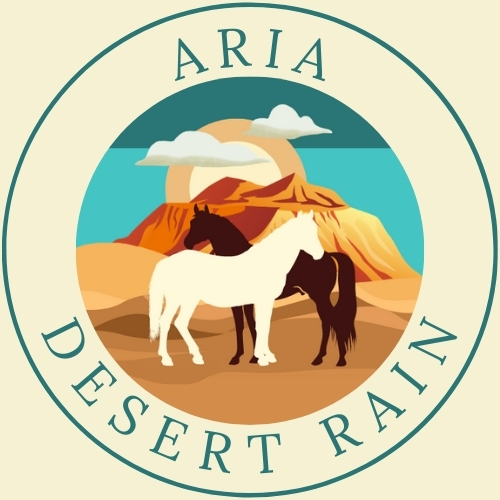Training Philosophy
At the heart of my training philosophy is compassion and partnership. I believe that the relationship between human and equine is more important than any specific achievement. By respecting the boundaries and needs of each equine, I create a space where both equine and human can feel safe, build trust, and work towards emotional balance together. For me, there is nothing more humbling and joyful than having my horses choose to be with me of their own accord. This connection, built on mutual understanding, is the foundation of everything I do.
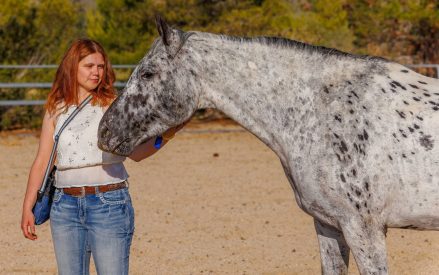
I use Positive Reinforcement (R+) as my primary training tool, always considering the emotional state of the equine. R+ is, in my belief, the best method because, when done correctly, it is force-free and allows the equine to truly be seen and understood during the training process. Training is not just about teaching behaviors, but about emotional growth and creating a partnership based on trust and mutual appreciation.
My journey began with my first horse, Crockett, whose needs and emotional challenges led me to discover R+. Through our work together, I learned that equines are deserving of compassion and emotional healing, just like humans. Watching Crockett transform—expressing himself more freely, developing new relationships with other horses, and finding emotional balance—taught me that, no matter how difficult the path may seem, healing is always possible.
As a coach, my goal is to help my students build the same deep connections with their equines that I have experienced. I guide them to build mutual trust, respect, and compassion, and I tailor my approach to the individual needs of each equine-human pair. Whether you’re just starting or are well along your journey, my methods are designed to create a supportive and adaptable learning experience that strengthens the bond between you and your equine.
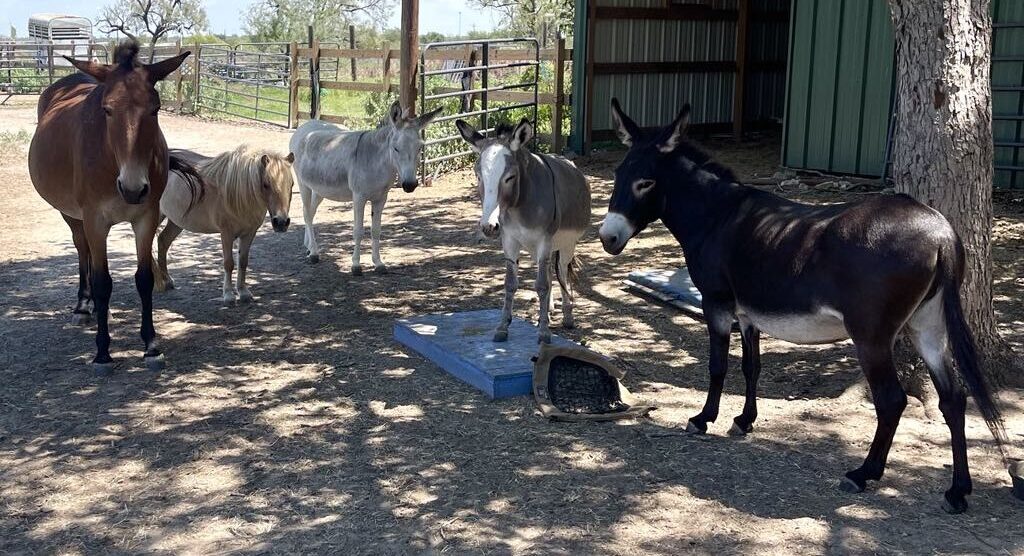
In addition, I embrace the unique needs of all equines, whether they are donkeys, mules, hinnies, or minis. These equines, often overlooked or misunderstood, deserve the same level of care, respect, and inclusion as any other. Compassion is at the core of my philosophy, and inclusion naturally follows, ensuring that every equine feels welcome, seen, and understood in their journey.
Coaching Topics
Connection and Confidence Building
Building a strong bond with your equine is the foundation for every successful training experience. By helping your equine become more confident and secure, both in new environments and around novelty objects, you nurture trust and mutual understanding.
Key skills:
Learn how to read your equine’s body language and respond with sensitivity.
Build trust by respecting your equine’s boundaries and learning to offer them choice.
Guide your equine to explore unfamiliar objects at their own pace, using enrichment exercises that re-engage their natural seeking system while staying within their comfort zone. This helps expand their confidence without causing anxiety.
Strengthen your relationship by establishing clear communication and mutual respect, helping your equine expand their window of tolerance in a calm and relaxed manner.
As you build confidence in your equine, you’ll notice more relaxed and enjoyable interactions, whether you’re exploring new places, introducing new objects, or working together in daily activities. A trusting, confident equine is a joy to be around, and this connection makes all training more effective.
“Aria can see where human and animal are on a learning path and can offer comments that help the learner modify the level of ‘ask’ for the mule.”
— Robin B., Kingsbury TX
Daily Handling and Trailer Loading
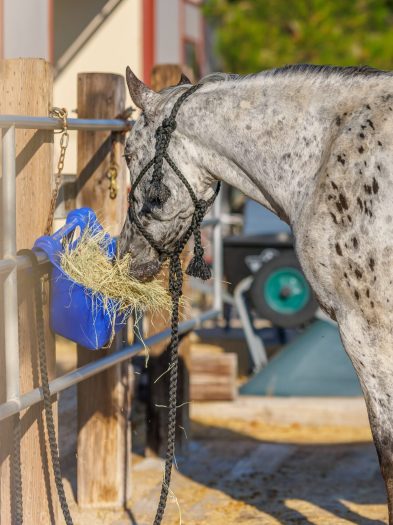
Daily tasks like handling, grooming, and trailer loading can be enjoyable for both you and your equine. By using positive reinforcement techniques, we make these essential interactions calm and pleasant, fostering cooperation and trust.
Key skills:
Teach your equine to approach willingly for catching and haltering.
Make leading and standing tied stress-free, ensuring your equine is comfortable.
Build positive associations with grooming and trailer loading for smooth, easy experiences.
Ensure traveling is a relaxed process, eliminating anxiety for both you and your equine.
Mastering these daily tasks strengthens your bond with your equine and reduces stress in everyday interactions. A willing, relaxed equine makes every part of your routine more enjoyable and sets the stage for successful training in other areas.
Emotional Balance and Regulation
Maintaining emotional balance in your equine is about more than just reducing stress during training—it’s about fostering resilience and emotional flexibility. By tuning into your equine’s emotional state and using tailored techniques, you help them build self-regulation skills that make every interaction more enjoyable, from training to daily routines.
Key skills:
Recognize the signs of stress and anxiety early.
Teach your equine how to regulate their emotions and stay calm in various situations.
Use positive reinforcement to build emotional resilience and confidence.
Helping your equine stay emotionally balanced enhances both the learning experience and their overall well-being. As they become more relaxed and confident, you’ll see positive changes not only in training sessions but also in how they engage with their environment and interact with other equines. Emotional balance leads to a calmer, happier equine in all aspects of life.
“Through Aria’s unwavering encouragement, compassionate philosophy, and detailed training plan, my mare and I are on a new path.”
— Gretchen W., Port Townsend, WA
Gymnastic Groundwork
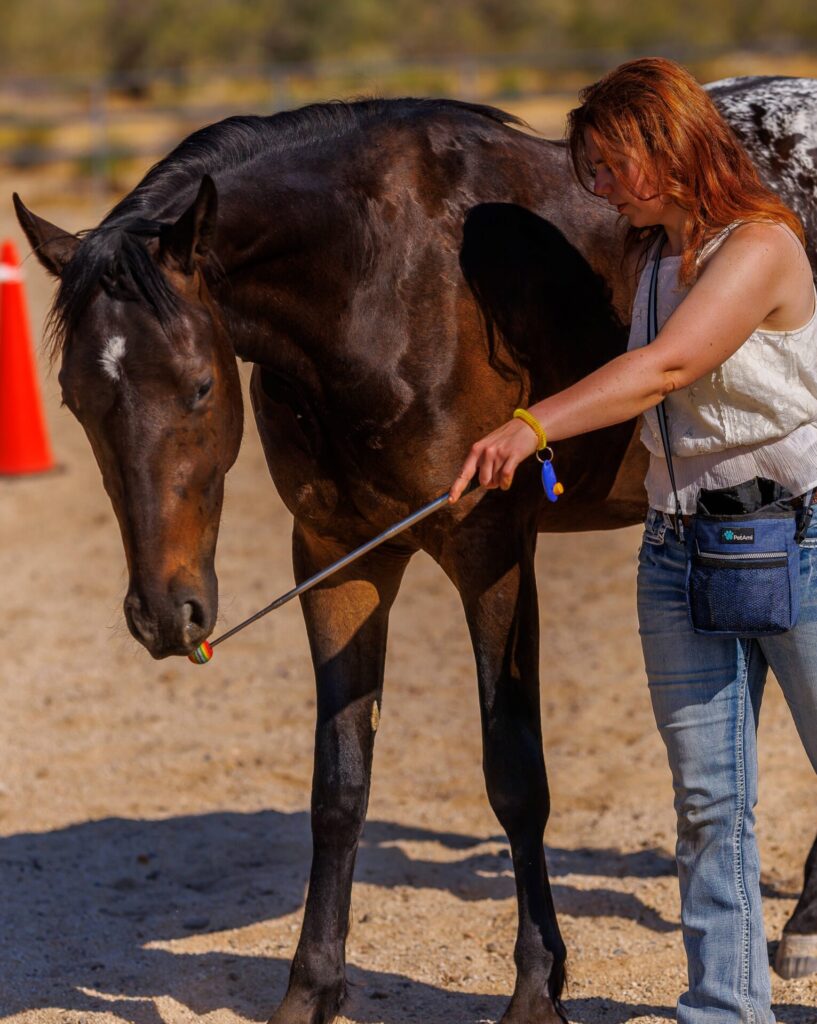
Gymnastic groundwork is key to building your equine’s physical agility and mental confidence. By improving proprioception and suppleness, this type of training not only enhances your equine’s balance and body awareness but also boosts their overall confidence in movement.
Key Skills:
Develop your equine’s balance and coordination through pole work and lateral flexions.
Teach body awareness and flexibility by engaging in exercises that improve suppleness.
Use body targeting to teach bending and collection, refining your equine’s movement and posture.
Create joy in movement by turning each exercise into a positive, rewarding experience.
Boost overall confidence by improving your equine’s body control and coordination.
Gymnastic groundwork lays the foundation for a more balanced, flexible, and confident equine. By focusing on physical strength and mental calmness, this training helps your equine become more sure-footed and agile in all areas of life, improving their overall performance and well-being.
Starting Under Saddle
Preparing your equine for riding starts with establishing solid ground cues and ensuring they are physically and mentally ready to carry a rider. By gradually introducing the necessary skills and creating positive experiences with the tack, you help your equine feel comfortable with saddling, lining up at the mounting block, mounting, and the new sensations that come with riding.
Key Skills:
Teach rein cues from the ground and smoothly transfer them to the saddle.
Train your equine to line up at the mounting block as a form of consent to mount.
Introduce tack in a way that ensures it becomes a neutral part of the routine, without causing stress or anticipation.
Teach your equine a cue to request dismounting, ensuring they are part of the process at every step.
Working from the ground first ensures that the equine doesn’t feel overwhelmed by having a rider, making the transition smoother and maintaining a strong connection as cues are transferred to the saddle. With proper preparation and allowing the equine to be an active participant—able to signal when they are ready to be mounted and dismounted—you’ll create a riding partnership that is enjoyable and safe for both equine and human.
“Aria is a very knowledgeable & patient teacher. She’s highly observant and thoroughly explains training steps to us so that there isn’t confusion when we’re working with our mare.”
— Rebecca M., Penasco NM
Healthcare Cooperation
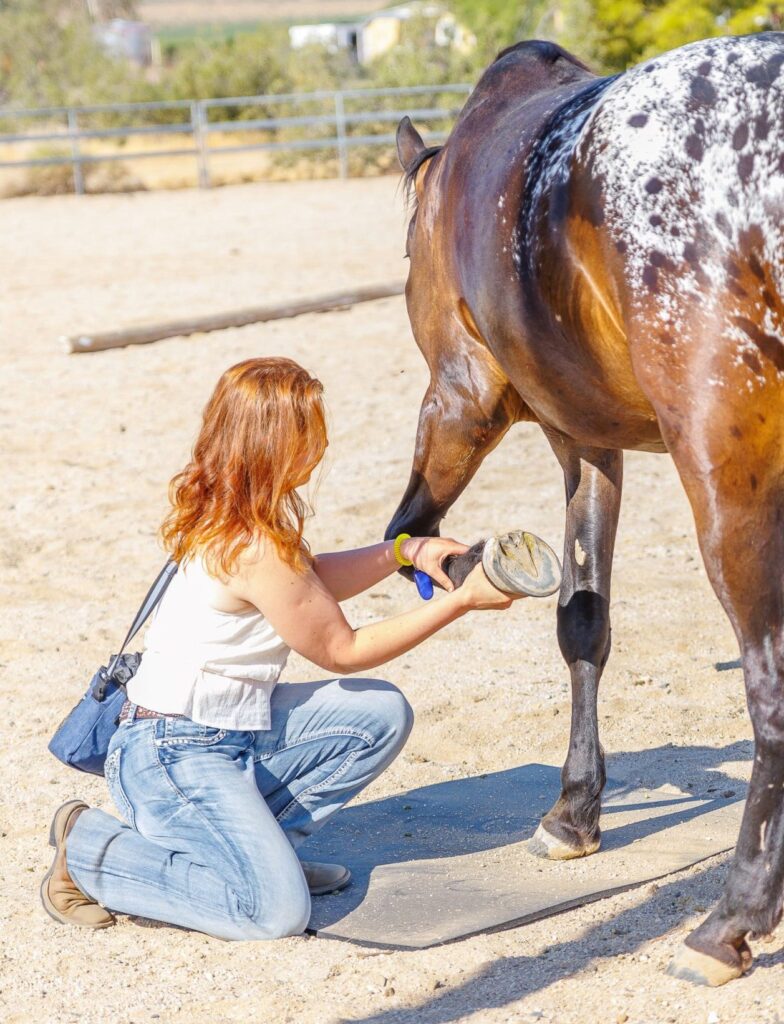
Healthcare cooperation is essential for creating a completely calm and positive experience during routine care. By allowing your equine to actively participate in the process, you build trust and ensure they feel safe and comfortable during handling, medications, and treatments.
Key Skills:
Gradually introduce new sensations—such as sounds, smells, and tastes—at your equine’s pace, like the sound and feel of fly spray or the smell and taste of an oral medication.
Use start buttons to allow your equine to signal when they are ready, ensuring they are in control and comfortable throughout the process.
Create positive associations with tools like hoof picks, trimmers, and rasps, so your equine remains calm and cooperative during routine care.
Teaching your equine to actively participate during healthcare tasks fosters a deeper bond and a positive experience for both of you. A calm, willing equine who feels in control of these interactions makes routine care smoother and less stressful, creating a more enjoyable experience for everyone involved.
Behavior Modification
Behavior modification addresses the root causes of behavioral challenges that stem from prolonged stress, trauma, or dysregulation. Many equines learn to live in a narrowed window of tolerance, oscillating between hyperarousal and shutdown. This approach focuses on helping your equine reconnect with their senses and adjust to a safe, supportive environment, where they can heal and thrive.
Key Skills:
Use ethical and compassionate training methods that focus on emotional regulation, allowing your equine to reconnect with their natural behaviors.
Create a safe space for your equine to explore and gradually expand their window of tolerance, helping them move out of hyper- or hypo-arousal states.
Address challenges like frustration, overarousal, or shutdown by focusing on long-term psychological health and emotional balance.
Addressing behavioral challenges in this way helps your equine find emotional balance and return to a state of well-being. By focusing on psychological health and creating a safe space, you’ll foster a deeper bond with your equine, making your relationship more fulfilling and stress-free.
“My horse made huge changes with the tips Aria gave me. Aria was always positive, she would always give me positive feedback even if she was suggesting I change something.”
— Sabra A., Tracy CA
Games
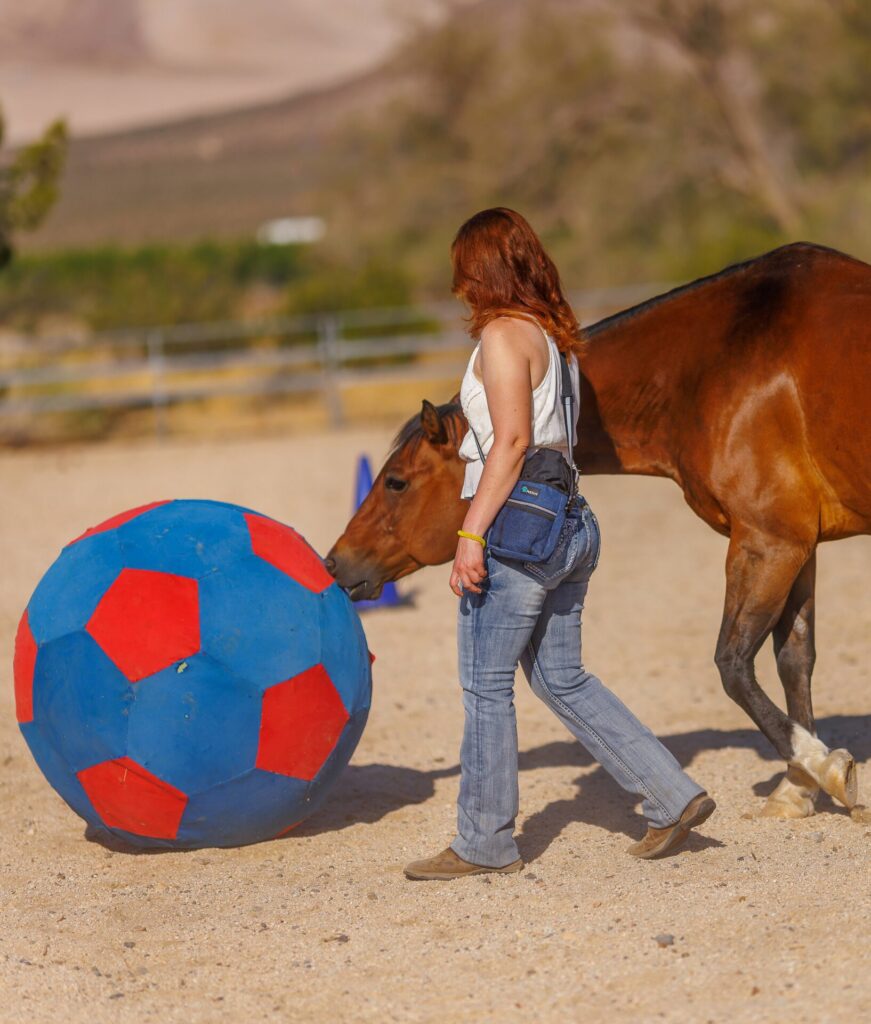
Teaching your equine to play games is not only fun but also a great way to strengthen your bond and stimulate their mental engagement. Through creative and interactive exercises, you can encourage curiosity, playfulness, and problem-solving in a relaxed and positive environment.
Key Skills:
Teach your equine to engage with objects like balls, pedestals, or targets to encourage curiosity and playfulness.
Use positive reinforcement to build new skills, such as fetching, spinning, or learning colors, while keeping the training fun and enjoyable.
Incorporate problem-solving games that help your equine develop confidence and mental flexibility.
Adding games to your equine’s training routine creates an opportunity for playful learning and connection. These activities enhance mental sharpness while strengthening your partnership in a joyful, relaxed atmosphere.
Ready to Strengthen Your Bond with Your Equine?
Every equine-human partnership is unique, and I’m here to help you navigate your journey with compassion, understanding, and expertise. Whether you’re ready to address specific challenges or explore new training goals, let’s work together to create a tailored approach that works for you and your equine.
